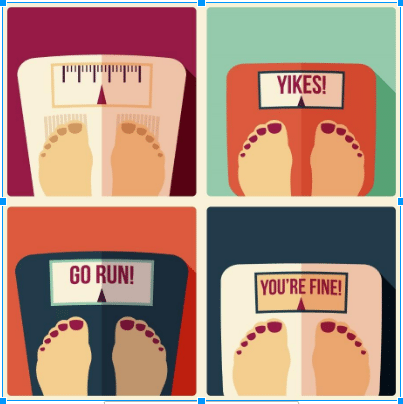Last year, at the tender age of 38, I decided to stop weighing myself every day after three decades of daily weigh-ins. I grew up in a household where it was deemed normal for a woman to weigh herself multiple times per day, so I followed suit. That learned behavior fostered my unhealthy relationship with weight and self-worth.
You might think it would be easy to give up such a tedious and emotionally polarizing habit, but it was actually difficult. The first week I worried about my weight non-stop in fear I was gaining weight without my knowledge (which is ironic because knowing never stopped me from allowing it to happen before). After having two panic attacks in a week, I said “Fudgsicle It!” and just leaned in. I am forever glad I did because what I learned changed my life.
#1: My sense of self was defined by the scale.
I am not proud to admit that my sense of self-worth was tied to the number on the scale. If I lost weight, I was jubilant and felt like I was Wonder Woman, lasso and all. When I gained weight, I immediately became anxious, doubted my performance in all things, and felt like I didn’t deserve the best in life. Now here is the really messed-up part — when my weight was the same, I was actually angry with myself for not losing. I couldn’t see the positivity in staying consistent because I was so focused on losing. I also obsessed about my weight all day long. Like Willie Nelson sang, “You (weight) were always on my mind.”
When I would not lose weight each day, I would mentally beat myself up and I would attribute all of the negative things in my life as being effects of my weight. This did two things: first, it made me feel like I deserved less strictly based on my weight; second, it stopped me from seeing the real issues that were affecting whatever I didn’t like in my life. The scale completely controlled my present and my future.
Health Strategist, Gus Turner, MPH encourages his clients to stay away from the scale and rather focus on how clothes fit and how their bodies feel, noting, “You should not put the control on something outside of yourself, and that is what the scale is.” He encourages clients to take a monthly picture of themselves in the same outfit and same time of day to get a better gauge of progress. He also notes that giving the scale that much power first thing in the morning can definitely affect your day and how you feel about yourself.
I noticed once I stopped focusing on my weight, I was able to identify what I wanted in life and what I need to work on (non-weight related) to get it. After a few months into my daily weigh-in embargo, I had more self-confidence and a much healthier sense of worth, and that lead me to better things.
#2: I learned the difference between weight loss and fat loss.
Muscle, fat, and water all have different compositions in the body. By being focused on that singular number on the scale, I was not giving myself enough credit for fat losses due to diet and exercise. Often times I would stop strength training because I seemed to be gaining weight even though every pound of muscle burns more calories per day than fat.
I learned to pay attention to how my body felt and also how my clothes felt. If my clothes are getting looser and my body is feeling stronger, I know my routine is working. When they feel tighter, I know I need to really pull back and focus on diet, exercise, and sleep. An advocate of healthy mindfulness, Turner reminds clients that how they feel should be their indicator of health development, not a number on the scale.
#3: The scale encouraged unhealthy behaviors based on temporary results that would ultimately throw me off course.
I found if I was having a great week of weight loss, I would give myself permission to indulge a little or lay-off a workout or two as a reward. When I gained weight, I would power up into drastic mode and do a water cleanse, attempt to work out multiple hours in a day, or give in to depressed binge eating. All I really ended up doing was reversing all of my hard work and requiring myself to start over again (and again, and again). Once I stopped daily weigh-ins, I was able to just follow my healthy principles without interruption.
Turner agrees and says it is a common way clients sabotage their success. He stresses that it all goes back to being mindful about your choices and why you make them. Rather than focusing on a number, focus on “caloric intake and being more active. Be mindful of when and why you eat. Keep a mindfulness journal to find triggers.”
Own Your Health And Trim Unwanted Weight With Our Ultimate Weight Loss Bundle
#4: I started paying attention to the numbers that really matter.
Once I stopped obsessing about my weight, I started paying attention to what I call “grown up numbers.” These are actually measures of health, risk, and life span; I soon learned they were what really mattered. I started focusing on blood pressure, blood sugar, cholesterol, and body fat percentage rather than my weight. In short, I started looking at my body as a long-term commitment instead of a one-night stand.
#5: I embraced my body and changed the way I thought about everything.
After ditching my morning weigh-ins, I evolved into a more positive person. Today I don’t think about my weight all day anymore. I focus on how I feel and how I want to feel instead, which lead me to better behaviors and habits. Also, every morning is a good morning now (even the ones where I hit snooze one or 10 times). I also started to see that all things were possible and no longer felt like everything was weight dependent; I was finally living my bliss-driven life.
 Jessica Lollino is a freelance lifestyle and wellness writer, poet and novelist, and English professor. She is also a certified yoga teacher. In addition to writing, she loves doing yoga, following her wanderlust wherever it leads her.
Jessica Lollino is a freelance lifestyle and wellness writer, poet and novelist, and English professor. She is also a certified yoga teacher. In addition to writing, she loves doing yoga, following her wanderlust wherever it leads her.
Submit your story or essay to Buzzworthy Blogs




